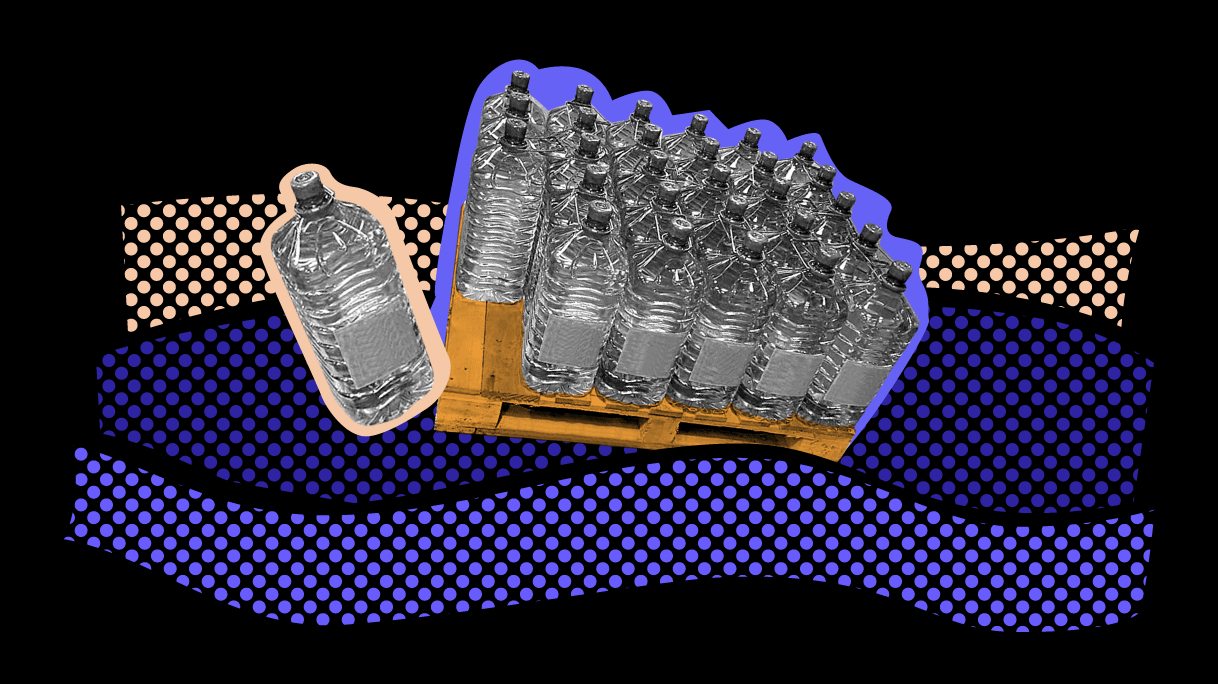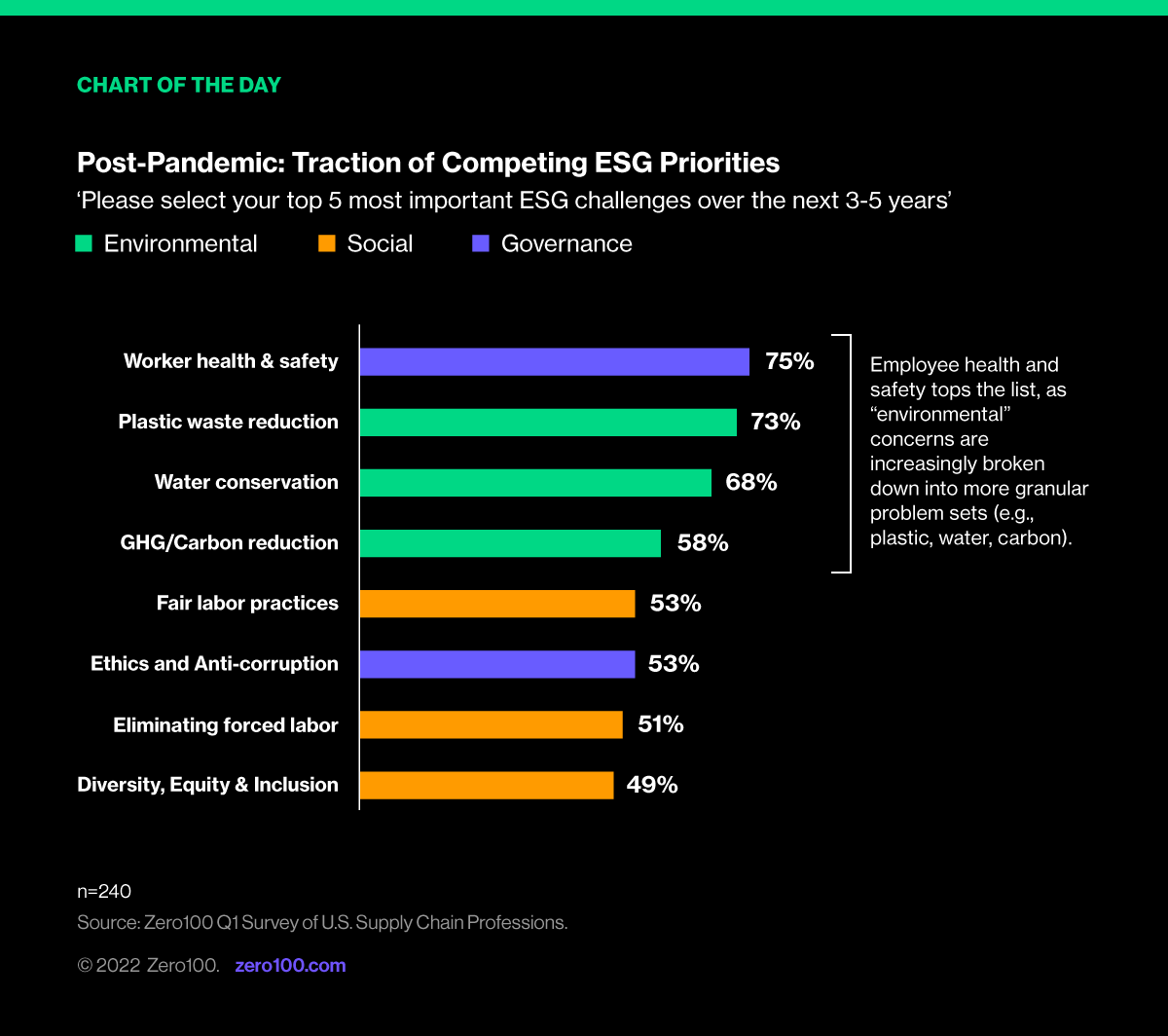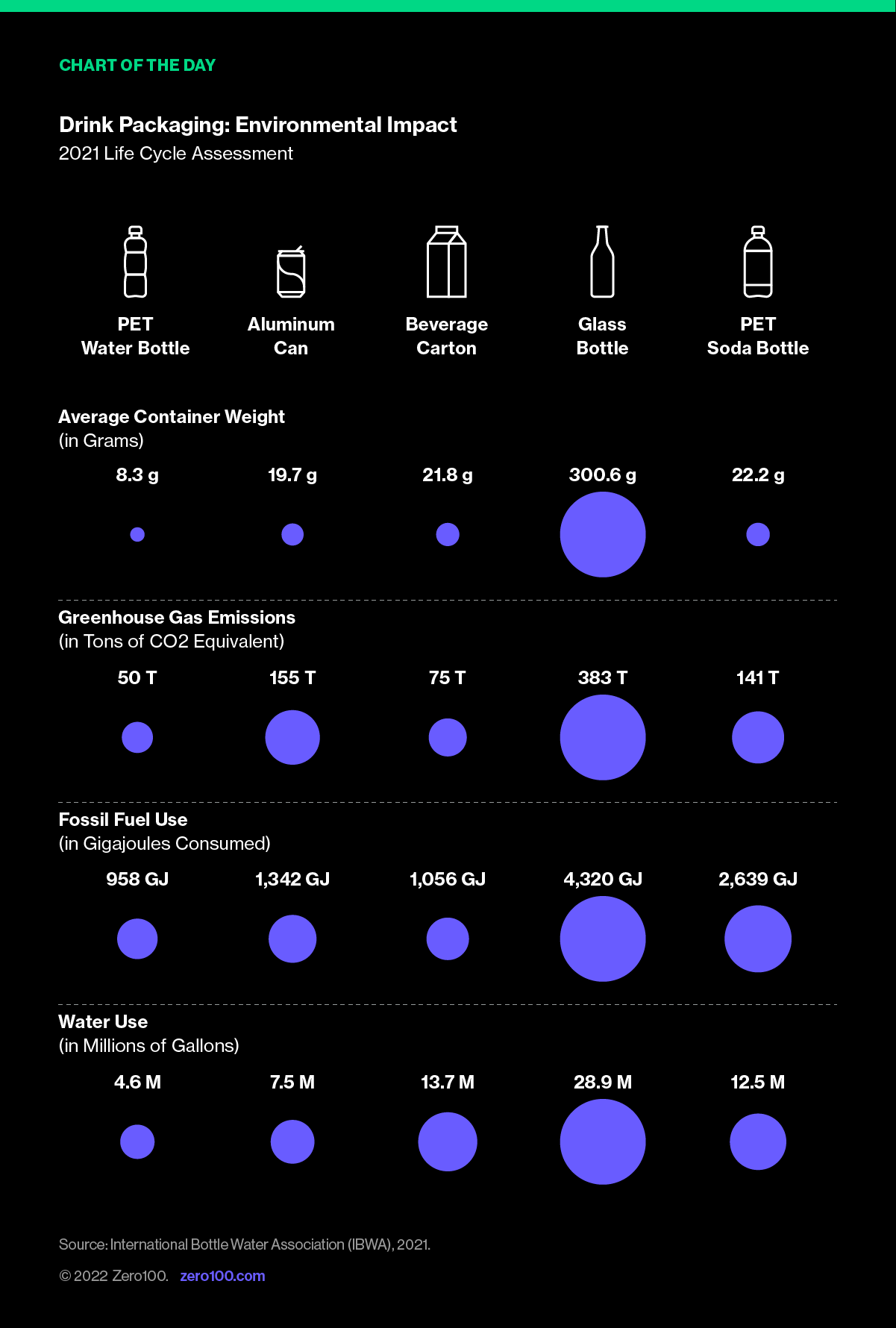
Innovating Out of the Looming Water Crisis
While the carbon accounting on a plastic bottle is old hat, the wider impact of shipping water around the globe is not receiving sufficient scrutiny. However, the convergence of consumer advocacy and production innovation is bringing this long overdue conversation into the limelight.
Bottled Water Is a Crime
In a recent survey conducted by Zero100, supply chain professionals identified plastic waste reduction, water conservation, and carbon reduction as three of the top-five ESG priorities within their organization. All three suffer when we ship drinks in plastic bottles, so why don't we do more to sell the idea that consumers can enjoy their refreshments without making such an environmental mess?

Water Wonders
Last year, 400+ food sector companies disclosed their water information to the Carbon Disclosure Project (CDP)—recording one of the highest disclosure rates by industry behind manufacturing and materials. This increased transparency yields great examples of water conversation efforts designed to stave off an impending freshwater crisis. PepsiCo is experimenting with “reverse osmosis” to improve the quality and mitigate the expense of wastewater. Mars is pioneering “wet-dry” irrigation systems to insulate rice farmers from rising costs.
The good news here is that many supply chain leaders have taken to heart the idea that water used in manufacturing processes is more like a tool than a resource – use it efficiently, clean it up, and put it back for future use. This logic works not only in food of course, but semiconductors (Intel), pulp and paper (Kimberly Clark), pharmaceuticals (Novartis), and much more...
Plastic Pressures
But these success stories are a distraction from the food and beverage industry's original sin - plastic bottles. Packaging is a big business ($129.8B), expected to nearly double by 2030 (+86% growth), with the “plastics” segment still growing fastest despite ever louder cries from activists. In response, more than 600 groups ranging from international environmental organizations to community advocates have signed The Presidential Plastics Action Plan. And earlier this month, the United Nations called for the first intergovernmental committee to explore a legally-binding treaty to end plastic pollution.
Water-soluble plastics, compostable recyclables, and bio-degradable plastics have yet to change the ugly math of moving water, soda, and sports drinks around the globe. The basic math for consuming plastic bottles is well-defined. The average bottle-drinking household drinks ~800 bottles per year. We're looking at roughly half a pound of carbon per 50-ounce container. Consequently, 400 pounds of plastic is about the equivalent of a 420-mile road trip. However, the literature remains weak on the total CO2 footprint of transporting bottled water. And yes, before you ask, FIJI water does come from a volcanic, artesian aquifer in the Yaqara Valley located on the Viti Levu in the remote South Pacific... It's not hard to see why so many people think this is just plain nutty.
Put more simply by Martin Murray (Founder & CEO, Waterdrop): “Putting sugar water into plastic bottles and shipping them around the planet—it's not only a lot of plastic bottles, but a lot of carbon dioxide emission for transport. In an ideal world, you don't have to bottle anything anymore...”
Skip the Plastic, Ship the Formula
Murray's company is only the latest in a long building wave of consumer product innovation that upends the practice of shipping water and waste plastic. Examples include:
WATERDROP: Among Europe's fastest-growing companies, Waterdrop is a “micro-drinks” venture that sells effervescent cubes that customers “drop” into water to create a flavored beverage. This effectively lowers the average ratio of food waste from 20-25% to 0.4%.
BLUELAND: Tackling the home care space, Blueland has diverted almost two billion plastic bottles from landfill and oceans since 2019. They provide the cleaning or soap refill tablet, you provide the water to start cleaning using one of its ‘forever' spray bottles.
SODASTREAM: Early to the game, PepsiCo's subsidiary SodaStream has been around for years and grew quickly during COVID as consumers stuck at home shopped for household items. This means more people than ever have had a chance to get the idea that neither water nor plastic needs to be shipped to get you a nice Scotch and Soda.
UNILEVER: UK cleaning brand, Cif, reduces water transport use by 97% with its 10x concentrated ‘ecorefill' pods. Diluted at home for use in kitchens, bathrooms and general antibacterial cleaning.
HOMETHINGS: With investment from Dragon's Den, the UK Shark Tank, Homethings refill tabs clean everything: 'allthings', 'baththings' and 'shinythings'. The ‘just add water' tabs help save 94% of transport emissions and is available in subscribe and save.
BY HUMANKIND: Even mouthwash is guilty of high water/alcohol content. By Humankind makes tablets to dissolve in water in its refillable, glass cup. This carbon neutral company specializes in natural personal care products.
Formulate & Fill On-Demand
So far, these ideas rely on the consumer at home to “just add water” which is great from a planet perspective, but doesn't make life easier for customers. Looking down the road a bit to a point where these kinds of “ship the ingredients” products intersect with the “have it your way” ethos, maybe there's a place for an aspirational capability we call: Formulate and Fill on Demand.
It's a few steps past what Starbucks is moving towards via reusable cups and is all about offering personalized formulations of things like shampoo, soft drinks, and laundry detergent. It's also 100% proven in at least one place – paint, which is formulated-and-filled, on-demand, every day at Home Depot.
Consumers won't have a hard time seeing the value, so it's up to supply chain organizations to make it available.

Critical Reading
WORLD TRADE ORGANIZATION
WTO Offers Unique Forum for Dialogue on Global Supply Chain Issue
Commentary: The Director-General of the WTO outlined a vision for “re-globalization” to bring more countries into international productions and thereby alleviate the choke points throughout the global supply chain network.
#resiliency #WTO
MCKINSEY & COMPANY
Transforming Supply Chains: Do You Have the Skills to Accelerate Your Capabilities?
Commentary: Update to 2017 survey results demonstrate mixed results across six industries over the past five years, resulting in an overall decline in supply chain capabilities. The profession is experiencing a schism between raw talent with no developed areas of domain expertise vs. veterans equipped with multi-disciplinary expertise spanning several functions.
#talent #datahighlight
THE NEW YORK TIMES
Will War Make Europe's Switch to Clean Energy Even Harder?
Commentary: Provocative extension of our discussion last week of oil and gas prices, examining how energy independence in Eastern Europe may actually roll back policy plans on the shift from coal to renewables.
#energy #Ukraine